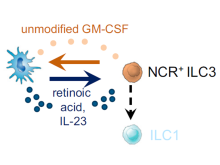BACKGROUND
Deregulated balance of the immune system strongly contributes to the development of chronic inflammatory conditions, like inflammatory bowel disease (IBD). A critical cellular element in sustaining immune and tissue homeostasis are mononuclear phagocytes (MNP), hematopoietic, migratory cells with superior capability to engulf and kill microbes, as well as priming and sustaining adaptive immune responses. Convincing animal research and accumulating evidence in humans suggest that these cells are fundamental in determining whether the immune system is activated or remains tolerant towards microbes. Key to their regulation, particularly in the intestinal tract, is the cytokine Granulocyte Macrophage-Colony Stimulating Factor (GM-CSF). Every 5th patient diagnosed with Crohn’s disease (CD) displays neutralizing autoantibodies (AuABs) against GM-CSF, posing a possible explanation for why previous phase II clinical trials, despite reporting overall improvement of symptoms, failed to reach statistically significant outcomes. If mechanisms to evade these antibodies can be designed, GM-CSF may prove to be an effective treatment against Crohn’s disease.
TECHNOLOGY
Inventors at the University of Toronto have genetically engineered GM-CSF to be a more effective therapeutic. They have found that mutating selective residues, resulting in altered glycosylation motifs while retaining normal biological function, facilitate the evasion from GM-CSF AuAB-mediated neutralization in CD patients. The investigators further identified that GMCSF AuABs are a reliable early serological marker preceding the diagnosis of CD by years. Serological recognition of GM-CSF AuABs further indicates CD severity and complications of disease at the time of diagnosis. This invention generates a cytokine and serological diagnosis tool that is suitable for therapeutic use in all CD patients including those with GM-CSF AuAB. This invention opens the door towards a true personalized diagnostic and therapeutic approach for the improvement and possible prevention of CD.
COMPETITIVE ADVANTAGE
- Diagnostic / Prognostic
- ~ 40% of Crohn’s disease patents can be diagnosed and even identified years in advance of disease onset
- Therapeutic
- Genetic modifications to Cytokine X allow it to evade the immune system and exert its preventive function even in CD patients with GM-CSF autoantibodies
APPLICATIONS
- Diagnosis and treatment of Crohn’s Disease
INTELLECTUAL PROPERTY STATUS
- Provision patent application (2020)
PROJECT STATUS
Elevated levels of autoantibodies against GM-CSF were detected in the serum of Crohn’s disease patients (Figure 1) demonstrating diagnostic potential. Genetically engineered GM-CSF proteins have been synthesized and their therapeutic potential is being tested for use in Crohn’s disease.
Figure 1. A subset of Crohn’s disease (CD) patients display autoantibodies (IgG) against the cytokine, Cytokine X. Elevated autoantibody levels are shown to be present in the positive control (PAP), while patients with ulcerative colitis (UC) and healthy individuals (HD) display significantly lower levels.





